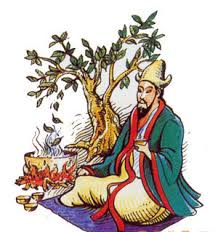
of ancient China
The venerable leaf we have come to know as tea was first discovered in China around 5,000 years ago, in an area situated between North Vietnam and Yunnan province. A popular and enduring story has come down through generations about how tea was discovered, supposedly in the year 2,737 BC.
The esteemed Chinese Emperor Shen Nung was journeying to a distant province, accompanied by his retinue of servants. As evening fell, the party stopped for rest and refreshment. As a rule of thumb, the emperor liked to have his drinking water boiled before it was served to him, being somewhat suspicious about its purity. Today was no exception. His servants set about heating a cauldron of water over an open fire to quench the emperor’s thirst. As the water neared boiling point, a gust of wind blew a few leaves from a nearby bush into the pot. The servant who ladled some of the boiled water into the emperor’s earthenware cup didn’t appear to notice this, or that the water had turned a golden colour. He courteously served the drink to his ruler.
A few moments later the emperor summoned his most trusted servant. “Are you trying to poison me? What on earth have you put in my drinking water?” he demanded to know. The terrified servant tried to think what he could have inadvertently spilled into the pot, hoping on pain of death that it couldn’t have been anything toxic. But then the emperor, who seemed to still be very much alive, gave a huge grin and declared, ‘Whatever it is, I love it!’
After tasting it, the emperor had discovered that whatever had found its way into the cup was refreshing, invigorating and delicious, and to his delight, there seemed to be no ill effects. Shen Nung was not in fact over fearful of what was in his water. He has been credited over the centuries as the father of Chinese medicine, due to his fascination with trying new, hopefully edible, herbs. During his lifetime, Shen Nung used himself as a human guinea pig by sampling several hundred new herbaceous plants, including cannabis, for their possible medicinal effects. He later chronicled them in a manual spookily entitled ‘On Herbal Medicinal Experiment Poisons’.
The newly discovered drink having been so enjoyed by their emperor, Shen Nung’s loyal servants picked all the leaves on that bush, as well as several cuttings of its shoots, and took them back with them to the emperor’s own province, and upon returning home, planted them in the palace gardens. And this is where according to stories handed down through the centuries, the drinking of this refreshing plant, which we came to know as tea, began.
Shen Nung’s habit of purifying drinking water by boiling it was certainly not a common practice in those years, and it seems that he was among the few who understood the value of doing so. This was one of the reasons why this ruler was considered a guru by many of his contemporaries.
Shen Nung, whose name translates as ‘Divine Healer’, came to be recognised as a courageous pioneer in identifying the healing power of Chinese herbs and harnessing their energising effects on the mind and body. He was in fact laying the foundations for traditional Chinese medicine, including acupuncture, Chinese physiotherapy, and other treatments designed to stabilise a person’s physical and mental balance. It is easy to understand why Shen Nung, whose name is also sometimes spelt as Shennong, became a god-like figure to the Chinese.
Sadly, the Emperor Shen Nung was not as fortunate as we twenty first century tea lovers. Having tasted over 300 different herbs to test their medicinal qualities, he eventually died of toxic poisoning, so severe that his intestines ruptured before he was able to down an antidotal cup of tea.
